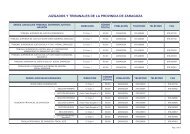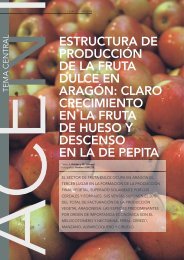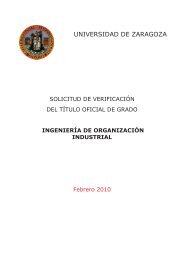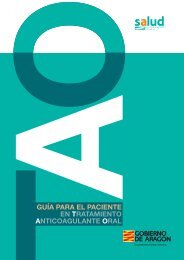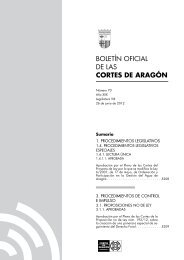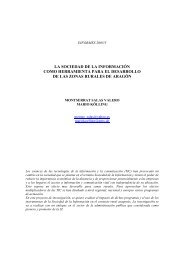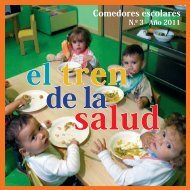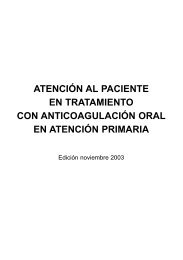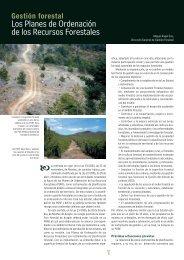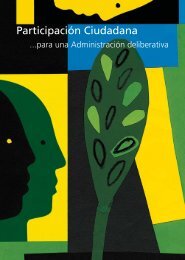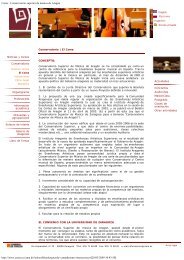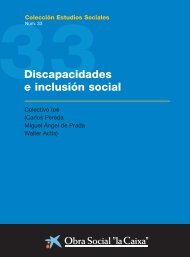Educación para todos: el imperativo de la calidad - unesdoc - Unesco
Educación para todos: el imperativo de la calidad - unesdoc - Unesco
Educación para todos: el imperativo de la calidad - unesdoc - Unesco
Create successful ePaper yourself
Turn your PDF publications into a flip-book with our unique Google optimized e-Paper software.
0<br />
0<br />
5<br />
456 / ANEXO<br />
2<br />
Informe <strong>de</strong> Seguimiento <strong>de</strong> <strong>la</strong> <strong>Educación</strong> <strong>para</strong> Todos en <strong>el</strong> Mundo<br />
UNICEF. 1999a. Trabajo doméstico infantil (Innocenti Digest, Nº 5). Florencia, UNICEF.<br />
—. 1999b. Education for all Florencia. Centro <strong>de</strong> Investigación Innocenti d<strong>el</strong> UNICEF.<br />
—. 1999c. Estado Mundial <strong>de</strong> <strong>la</strong> Infancia 1999. Nueva York, UNICEF.<br />
—. 2000. Defining quality in education. Nueva York, UNICEF.<br />
Usher, R.; y Edwards, R. 1994. Postmo<strong>de</strong>rnism and education. Nueva York, Routledge.<br />
Välijärvi, J.; Linnakylä, P.; Kupari, P.; Reinikainen, P.; y Arffman, I. 2002. The Finnish success in PISA-and some<br />
reasons behind it. Jyvasky<strong>la</strong>, Instituto <strong>de</strong> Investigaciones sobre <strong>la</strong> <strong>Educación</strong>, Universidad <strong>de</strong> Jyvasky<strong>la</strong>.<br />
Van Graan, M.; Pokuti, H.; Lecz<strong>el</strong>, D.; Liman, M.; y Swarts, P. 2003. Practising critical reflection in teacher education:<br />
case study of three Namibian teacher <strong>de</strong>v<strong>el</strong>opment programmes. Documento <strong>de</strong> trabajo pre<strong>para</strong>do <strong>para</strong> <strong>la</strong><br />
Reunión Bienal sobre <strong>la</strong> Calidad <strong>de</strong> <strong>la</strong> Asociación pro Desarrollo <strong>de</strong> <strong>la</strong> ADEA (Grand-Baie, Mauricio, 3-6 <strong>de</strong><br />
diciembre <strong>de</strong> 2003). París, Asociación pro Desarrollo <strong>de</strong> <strong>la</strong> <strong>Educación</strong> en África (ADEA).<br />
Van Laarhoven, P.; y <strong>de</strong> Vries, A. M. 1987. “Effecten van <strong>de</strong> interk<strong>la</strong>ssikale groeperingsvorm in het voortgezet<br />
on<strong>de</strong>rwijs: resultaten van een literatuurstudie” [Efectos d<strong>el</strong> agrupamiento heterogéneo en <strong>la</strong>s escualss<br />
secundarias: resultados <strong>de</strong> los estudios literarios] en J. Scheerens y W. G. R. Sto<strong>el</strong> (compi<strong>la</strong>dores), Effectiviteit<br />
van on<strong>de</strong>rwijsorganisaties [Eficacia <strong>de</strong> los sistemas educativos]. Lisse (Países Bajos), Swets & Zeitlinger.<br />
Vawda, A.; y Patrinos, H. 1998. “Cost of producing educational materials in local <strong>la</strong>nguages” en W. Kuper<br />
(compi<strong>la</strong>dor), Mother-Tongue Languages in Africa: A Rea<strong>de</strong>r. 2ª edición. Eschborn, GTZ.<br />
Ved<strong>de</strong>r, P. H. 1985. Cooperative learning. A study on processes and effects of cooperation between primary school<br />
children. La Haya, SVO.<br />
Vegas, E.; y De Laat, J. 2003. Do differences in teacher contracts affect stu<strong>de</strong>nt performance Evi<strong>de</strong>nce from Togo.<br />
Documento <strong>de</strong> referencia <strong>para</strong> <strong>el</strong> Informe <strong>de</strong> Seguimiento <strong>de</strong> <strong>la</strong> EPT en <strong>el</strong> Mundo 2005.<br />
Vermeersch, C. 2002. School Meals, Educational Achievement and School Competition: Evi<strong>de</strong>nce from a Randomized<br />
Experiment. Cambridge (Massachusetts, EE.UU.), Universidad <strong>de</strong> Harvard, (Documento <strong>de</strong> trabajo).<br />
Vijverberg, W. P. M. 1999. “The impact of schooling and cognitive skills on income from non-farm s<strong>el</strong>f-employment”<br />
en P. G<strong>el</strong>wwe (compi<strong>la</strong>dor), The economics of school quality investments in <strong>de</strong>v<strong>el</strong>oping countries: An empirical<br />
study of Ghana. Nueva York, St. Martin’s Press y Universidad <strong>de</strong> Oxford.<br />
Vince-Whitman, C.; Aldinger, C.; Levinger, B.; y Birdthistle, I. 2001. School Health and Nutrition. Evaluación <strong>de</strong> <strong>la</strong><br />
<strong>Educación</strong> <strong>para</strong> Todos en <strong>el</strong> Año 2000. Estudio temático. París, UNESCO.<br />
Voigts, F. 1998. The Quality of Education: Some Policy Suggestions Based on a Survey of Schools, Namibia. París,<br />
Ministerio <strong>de</strong> <strong>Educación</strong> Básica y Culture <strong>de</strong> Namibia/Instituto Internacional <strong>de</strong> P<strong>la</strong>neamiento <strong>de</strong> <strong>la</strong> <strong>Educación</strong><br />
(IIPE) <strong>de</strong> <strong>la</strong> UNESCO (Informe sobre investigación <strong>de</strong> políticas d<strong>el</strong> SACMEQ, Nº 2).<br />
Vo<strong>la</strong>n, S. 2003. Educational Reform and Change in The South: a matter of restructuring as w<strong>el</strong>l as reculturingexperiences<br />
from Zambia. Tesis <strong>de</strong> doctorado (inédita). Southampton, Universidad <strong>de</strong> Southampton.<br />
VSO. 2002. What makes teachers tick A policy research report on teachers’motivation in <strong>de</strong>v<strong>el</strong>oping countries.<br />
Londres, Voluntary Service Overseas (VSO).<br />
Vygotsky, L. S. 1962. Pensamiento y lenguaje. México, Editorial Paidós.<br />
—. 1979. El <strong>de</strong>sarrollo <strong>de</strong> los procesos psicológicos superiores. Barc<strong>el</strong>ona, Editorial Crítica.<br />
Wa<strong>de</strong>, R. 1990. Governing the Market: Economic Theory and the Role of Government in East Asian Industrialization.<br />
Princeton, Princeton University Press.<br />
Walberg, H. 1991. “Improving school science in advanced and <strong>de</strong>v<strong>el</strong>oping countries”. Review of Educational<br />
Research, Vol. 61, Nº 1, págs. 25-69.<br />
Walter, S. L. En prensa. Literacy, Education and Language. Dal<strong>la</strong>s, SIL International.<br />
Wang, M. C.; Haert<strong>el</strong>, G. D.; y Walberg, H. J. 1993. “Toward a knowledge base for school learning”.<br />
Review of Educational Research, Vol. 63, Nº 3, págs. 249-294.<br />
—. 1994. “Qu’est-ce qui ai<strong>de</strong> l’élève à apprendre “ Vie pédagogique, Nº 90, págs. 45-49.<br />
Weeda, W. C. 1986. “Effectiviteitson<strong>de</strong>rzoek van scholen” en J. C. van <strong>de</strong>r Wolf y J. J. Hox (compi<strong>la</strong>dores),<br />
Kwaliteit van het on<strong>de</strong>rwijs in het geding. Lisse (Países Bajos), Swets & Zeitlinger (Publicaciones d<strong>el</strong> Centro<br />
Pedagógico <strong>de</strong> Ámsterdam, Nº 2).<br />
Weikart, D. P.; Montie, J.; Xiang, Z. 2004. Preschool Experience and Age 7 Child Outcomes: Findings from<br />
10 Countries. Ypsi<strong>la</strong>nti (Michigan, EE.UU.), High/Scope (www.highscope.org/Research/iea.htm).<br />
Weikart, D. P.; Olmsted, P.; y Montie, J. (compi<strong>la</strong>dores). 2003. IEA Preprimary Project, Phase 2: A World<br />
of Experience. Observations in 15 countries. Ypsi<strong>la</strong>nti (Michigan, EE.UU.), High/Scope.



